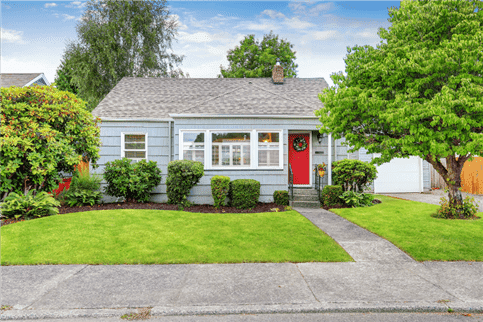Buying a home is a reliably good investment. The median sales price of a home has risen steadily over the past 50 years, from $33,600 in the second quarter of 1974 to $412,300 in the second quarter of 2024. But that doesn’t mean there are not occasional dips in value, which can leave homeowners with negative equity – owing more on their home than it’s worth. Here’s what can cause negative equity and some ways to address it if it happens to you.
Key Takeaways:
- Negative equity is when your home is worth less than you owe on it.
- Declining property values are the primary cause of negative equity, but it also can be affected by failing to maintain your home or missing mortgage payments.
- Your options for addressing home equity include continuing to pay down your mortgage, making extra mortgage payments and increasing the value of your home.
What Is Negative Equity?
Equity generally refers to how much of your home you own. More specifically, it’s the value of your home minus what you owe on it. One of the advantages of owning a home is that you typically build equity in two ways: You reduce the amount you owe as you pay down your mortgage balance and your home appreciates in value. Equity is valuable because you can borrow against it with a home equity loan or line of credit, or convert it to cash when you sell your home.
However, in some situations, your equity can shrink, resulting in negative equity. This is when you owe more on your home than it’s worth. Again, this can happen in two ways: The amount you owe on your home increases in some way, or your home loses value.
Negative equity limits your financial flexibility. If you have to sell a home with negative equity, you would lose money on the deal.
“If you have negative equity, you will have to bring money to the closing to pay off the mortgage (when you sell your home),” says Jay Zigmont, a certified financial planner and founder of Childfree Wealth. “For many people, this may mean you are ‘house poor’ or stuck with the house and can’t move. Your first few years of mortgage payments will not lower your low balance much. This is why we often recommend buying a house only if you are going to be there five to seven years or more.”
Negative Equity Example
Imagine you buy a home for $450,000. You make a 5% down payment, so you borrow $427,500, giving you $22,500 in equity.
You own the home for a year, and property values in your area fall. Your home loses 10% of its value, so it’s now worth $405,000. In the meantime, you’ve paid $7,500 in principal on your loan and still owe $420,000 on your home. That means you owe $15,000 more than your home is worth.
What’s Your Goal?
Buy A Home
Discover mortgage options that fit your unique financial needs.

Refinance
Refinance your mortgage to have more money for what matters.
Tap Into Equity
Use your home’s equity and unlock cash to achieve your goals.
What Causes Negative Equity?
A few factors can lead to negative equity, some of which are in your control and others not.
Declining Housing Market
This is the most common reason for negative equity. If you buy a home or borrow against it when the market is at its peak, a decline in home values can result in negative equity.
The state of the market and where it goes out of your control, but you can take some steps to be a more informed borrower.
Educate yourself on market predictions and stay updated on where it is and where it’s predicted to go. Get information from trusted sources, including real estate professionals. If the market does dip, don’t panic. There are some actions you can take that we’ll mention later in this article.
Poor Home Condition
The value of a home relies in part on its condition. If your home falls into disrepair, its value will decline. Make sure you maintain your home, make repairs as soon as there is an issue, and even make improvements when you can.
Missed Loan Payments
Missing a mortgage payment is bad for several reasons. For one, it will damage your credit score, adding a missing payment to your credit report. That can make it harder to get future loans.
Missed payments also mean that you don’t pay off interest as it accrues, which increases the speed at which interest accrues. It also leads to fees and penalties from your lender.
If you’re treading water, missing a payment or two can lead to negative equity from the penalties, fees, and additional interest added to what you owe.
Small Down Payment
The more money you put down on a home, the more equity you’ll have from the start, which can protect you from negative equity if your home loses value. If you take out a loan with little or no money down and the market drops soon after you purchase, you’ll almost immediately have negative equity. Take the time to save for a larger down payment or consider more affordable properties.
A Change in Combined Loan-to-Value Ratio
The combined loan-to-value ratio of your property is the total balance of all loans secured by your property divided by the value of your home.
For example, if you own a home worth $500,000, have a mortgage with a $250,000 balance, a $50,000 home equity loan, and a $20,000 HELOC, your CLTV is:
($250,000 + $50,000 + $20,000) / $500,000
$320,000 / $500,000 = 64%
If you get more loans that are secured by your home’s value, it will reduce the amount of equity you have, making it easier for other factors to push your equity into the negatives.
Ready To Refinance?
Get matched with a lender that can help you reach your financial goals.
How to Escape Negative Equity
The good news is that negative equity doesn’t have to mean financial ruin. It’s a problem that will cause you financial hardship only if you need to refinance your home, plan to borrow your equity, or need to sell your home. If you can afford your monthly mortgage payment, paying down your balance over time will erase negative equity.
“If your home has negative equity, the only solution may be to work on paying off the mortgage faster,” Zigmont says. “You can make additional payments to the principal in order to lower the balance. You can hope your home goes up in value, as that will also impact your equity, but there is no guarantee that this will happen.”
1. Wait It Out
If you have negative equity from a drop in the market, you could continue to make monthly payments as usual and wait it out. Typically, home values will increase over time. You’ll just need to decide if you’re willing to wait and for how long.
2. Make Extra Payments
If you can, make extra loan payments along with your regular monthly payments. For most loans, you can apply that extra payment to the principal balance. This will lower your balance and increase your equity faster.
One simple way to make one full extra payment on your loan is by making biweekly payments on your mortgage instead of one monthly payment. Simply pay half your monthly payment every other week, and at the end of the year, you’ll have made the equivalent of 13 monthly payments instead of 12.
3. Increase The Value Of Your Home
Increasing the market value of your home is one way to increase the equity you have in it. A few ways to increase the value of your home include:
- Upgrading your kitchen or bathroom
- Upgrading old appliances
- Improving the curb appeal
- Repairing roof, foundation or plumbing issues
- Replacing your heating and cooling units
- Finishing your basement
- Adding a patio
Whatever you do to raise the value of your home, make sure your changes are affordable and don’t put you into more debt.
Once you have completed the renovations and upgrades to your home, you can get a home appraisal to assess the new value of your property and see if your home’s value has increased.
4. Sell Your Home
You can get rid of your negative equity by selling your home, though it may be difficult and will cost you money.
You’re responsible for the difference if you sell your home for less than you owe on the mortgage. That means you must pay your lender cash when you sell your home, and you’ll walk away with nothing. For example, if you owe $450,000 and sell for $425,000, you can pay the $25,000 out of pocket to get out of the loan and the negative equity.
5. Ask Your Lender For A Short Sale
You also can consider a short sale. During a short sale, you work with your lender, and if they agree, you sell your home for less than the amount you owe. The lender agrees to forgive the loan, even if the sale of the home doesn’t fully cover the mortgage. Keep in mind that lenders aren’t obligated to allow a short sale, so make sure that you consider other options in case your lender isn’t willing.
View Your Refinancing Options
Find a refinance lender that will work with your unique financial situation.
The Bottom Line
Negative equity happens when you owe more on your mortgage than your home is worth. A few factors can cause this, but it’s usually due to falling home values. It can also be caused by a buyer’s actions when purchasing the home, like making a small down payment or paying the difference after an appraisal comes in low. Negative equity can make it challenging to sell a home or even refinance your loan. If you find yourself upside down on your mortgage, try to find ways to pay down your loan balance or increase the value of your home to lessen the blow.

T.J. Porter
T.J. Porter is a Boston-based writer who focuses on credit cards, credit and bank accounts. When he's not writing about all things personal finance, he enjoys cooking, esports, soccer, hockey, and games of the video and board varieties.








